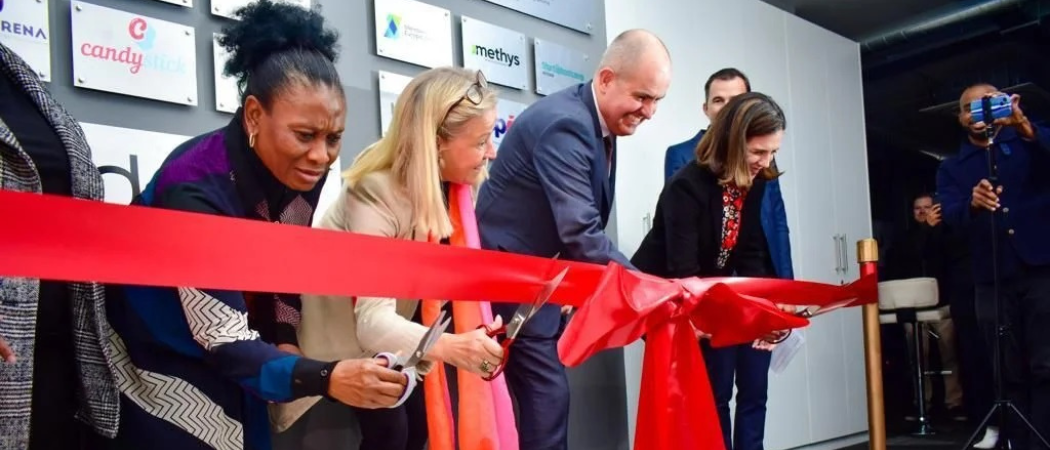A project that built links between accelerators, incubators and start-ups in Europe and Africa shows the potential for benefit on both sides. A centre in Cape Town will now continue its work.

Representatives of the African Union and European Union officially open the Enrich in Africa Center in Cape Town. From left to right, Principal Scientific Officer at the African Union Commission’s Department of Education, Science and Technology, Monica Ebele Idinoba; EU Ambassador to South Africa, H.E. Sandra Kramer; Deputy Director-General for International Cooperation and Resources at the South African Department of Science and Innovation, Daan Du Toit and European Commission Director for Global Approach and International Cooperation in Research & Innovation, Maria Cristina Russo. Photo courtesy of the Ortus Brand Institute.
The EU has a long history of research cooperation with Africa, but has only recently turned its attention to innovation cooperation. The challenge has been to find a way of working that is mutually beneficial, rather than reproducing the one-sided relationships typical in development aid projects.
The conclusion this year of the ‘Enrich in Africa’ project, which set out to connect innovation ecosystems in Europe and Africa, is one sign that a successful way forward may have been found. Its approach, and the community it has built, will now be taken forward by the Enrich in Africa Centre, based in Cape Town.
“I think the biggest prize for both regions is understanding each other, and each other’s markets, removing the preconceptions that stand in the way of people working together,” said Zandile Ntuli, manager of the centre. “The next benefit is market access, so that solutions are shared equally.”
There is also the possibility of closing the gap for innovations moving at different speeds in Africa and Europe. For example, mobile money has developed rapidly in Africa, while Europe has focused heavily on deep tech.
“The innovations that make it, make it because the market needs them, and that is the same in Africa and Europe,” Ntuli said. “But there is something to be learned in Africa about how innovations succeed against the odds, in some cases when very little infrastructure is in place, because the market needs them so much.”
For the EU, these initiatives take place in a wider policy agenda that aims to redefine the relationship between Europe and Africa. “The aim has been to change the paradigm from development aid to cooperation, which is in line with the 2019 EU-Africa Strategy,” said a Commission official.
A dedicated strategy for innovation was set out in the EU-African Union innovation agenda, endorsed by both parties in July 2023. “The idea is to translate research and innovation endeavours into tangible products and services, that create business and jobs in Africa and in Europe,” the official said.
Connecting innovation ecosystems
Enrich in Africa, which was funded by Horizon Europe, began in 2021 with the goal of connecting innovation ecosystems in Africa and the EU, in particular through ecosystem support organisations (ESOs). “We wanted incubators and accelerators that were already implementing programmes on the ground to work together and co-create something that would benefit them both,” said Eva Kopf, project manager at the Steinbeis Europa Zentrum, which coordinated Enrich in Africa.
“A common mistake that European organisations tend to make is to think that implementing what worked in Europe, will work in Africa,” said Covadonga Rayón, EU project manager at the European Business and Innovation Centre Network (EBN), which also participated in the project. “But Africa and Europe don’t have the same needs, so the solution is co-creation, an equal collaboration to come up with initiatives that work for both sides.”
One way that Enrich in Africa approached its goal was through a twinning programme for African and European accelerators and incubators. “Some accelerators and incubators in Africa are very well developed, and at the same stage as their European partners, so what they wanted was to implement programmes together,” said Rayón. “In other pairs, the European partner ended up supporting the African partner to overcome specific challenges.”
At the same time, the European partners were able to gain insights in to the African market. “The role of the collaboration was also to educate incubators and accelerators in Europe and to showcase the opportunities in Africa,” Rayón said.
One example of a twinning exchange involved Technoport in Luxembourg and Impact Hub Dakar in Senegal. The collaboration involved Impact Hub providing a ‘local’ digital marketing expert to support 15 entrepreneurs taking part in programme of on-site mentoring and training delivered by Technoport in Burkina Faso. At present, both organisations are looking for programmes that will allow them to continue sharing their expertise.
In addition to the twinning programme, Enrich in Africa ran a mentoring programme and a bootcamp to help build capacity and encourage exchanges between African and European incubators and accelerators. The project also offered support to individual start-ups through soft landing programmes and learning expeditions to help them approach new markets in Europe and Africa.
On the European side, the principal benefits of the project were the opportunity to learn more about African markets. “The population in Africa in much younger than in Europe, and it is growing, so in terms of market size and availability there is lots of scope for development,” said Kopf.
Awareness of the different needs and challenges in Africa will also open up new opportunities. “Some of these needs can already be addressed with technological solutions that have already been developed in Europe,” said Rayón.
These different local needs are also effective in driving innovation in Africa, with results that might also find applications in European markets. “Sometimes you have the idea that Africa lags behind Europe in technology, but that is not necessarily the case. The level of creativity is very high,” said Kopf.
This attention to local needs also apparent in the way African incubators and accelerators work. “For example, when we talk in Europe about incubation and acceleration programmes in agriculture, the dominant theme is digitalisation,” Rayón said. “In Africa, they also look at digitalisation, but they are much more aware of the practical problems that their farmers need to solve.”
Working to eliminate gender inequality is another area where Europe and Africa can learn from each other. “There are lots of female entrepreneurs in Africa, driven by need because of the unemployment rates,” said Kopf. “They then face challenges when it comes to growth and expanding their businesses, and this is what we are trying to address with the incubators and accelerators.”
The Enrich in Africa Centre, which has been operating since the beginning of 2024, has inherited the network of accelerators, incubators and start-up hubs built by the project, and will continue to provide most of the services offered, on a self-sustaining basis. The aim is to continue to support both African and European innovation ecosystems. “Our aim is to be the bridge between the two,” said Ntuli.
At present there are 59 ESOs in the network, with roughly a third from Europe and two-thirds from Africa. The best represented countries are Nigeria, Kenya and Ghana in Africa, and France and Spain in Europe.
The ESOs that participated for free during the project, to test the concept, will now be charged a membership fee, and additional services will be offered on a commercial basis. Direct support for start-ups will also continue, including matchmaking for companies seeking partners, where that does not compete with the services offered by the members of the network.
“If we are effective at forming partnerships or collaborations between corporates and start-ups or ESOs, then we will be able to charge for that service,” said Ntuli.
The centre has also identified a demand for financial training and support from African ESOs. “This includes grant writing support to help them secure funding, information on what different funders are looking for, and how to set up the business model for an incubator or accelerator so that it can be sustainable,” Ntuli said.
Most of the European ESOs participating are relatively mature, and are looking to broaden their networks in Africa, both on their own account and for the start-ups they are supporting.
“European incubators are looking to internationalise, they are looking for market access, and to be part of our twinning programmes that pair institutions in Africa and Europe,” said Ntuli.
The African ESOs are also looking for partnerships to extend their offers regionally and globally, to help start-ups with an interest in accessing pan-African and European markets. In addition, they are looking for financial support from funding institutions, including those in Europe. “Even the medium to mature accelerators are looking for opportunities for funding so that they can be more sustainable,” Ntuli said. “The ESOs are seeking access to larger and more regional projects or programmes with greater impact to open up new markets while ensuring sustainability.”
Ntuli sees good potential to expand the network in Africa and Europe and further develop the centre’s offer. This development is likely to be gradual. “We have to try not to spread ourselves too thinly, and to grow organically with a strong core offering before we venture out into other things,” Ntuli said.
She also sees a role for the centre in helping to develop a more supportive policy environment for start-ups. “We want to be part of policy conversations, to make sure that legislation better supports start-ups and innovations in Africa.”
The Commission is keen to capitalise on the momentum and by the political backing of the EU-African Union innovation agenda. “We have built something new, something that works, and we need to follow up the possibilities that exist,” said the Commission official. At the same time, this framework should not be stretched too far, in particular when it comes to the principal of cooperation. “We should not go further if it is not together,” the official said.
Elsewhere in the Ecosystem…
- French engineering school CentraleSupélec is to receive a €45 million loan from the European Investment Bank for the renovation of its Bréguet building, creating a new innovation hub for the school. The hub will feature academic research labs, facilities where companies can pursue applied research, and space for entrepreneurial projects proposed by students and graduates of the school. The building will re-open in the autumn of 2026.
- Vyoma, a German start-up from 2020 developing a space-based tracking system for satellites and space debris, has secured a €5 million investment from a space tech fund operated by Atlantic Labs, with backing from the European Investment Fund. The additional capital will fund technical development of the system, and expansion of the company’s engineering team.
- Venture capital fund Quantonation, based in Paris and Boston, has closed the first €70 million of its second fund dedicated to quantum technologies. The final target for the fund is €200 million. Quantonation II will make pre-seed and seed investments in around 25 early-stage companies. Four investments have already been made from the fund, in Pioniq, Resolve Stroke and SteerLight, all from France, and in Diraq from Australia.
- The European Innovation Council has announced the first 48 companies that will be joining its scaling club, an initiative designed to help deep-tech start-ups attract further investment and grow towards unicorn status. The participating companies will receive tailored mentoring and access to business partners such as corporates and investors. The companies selected are spread over four sectors: digital security; next-generation computing; mobility and transport; and renewable energy. Eventually the club will expand to cover other sectors, with a total of 120 members.





 A unique international forum for public research organisations and companies to connect their external engagement with strategic interests around their R&D system.
A unique international forum for public research organisations and companies to connect their external engagement with strategic interests around their R&D system.